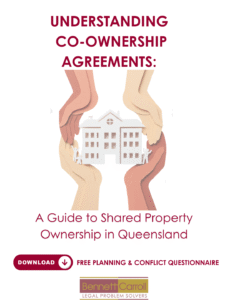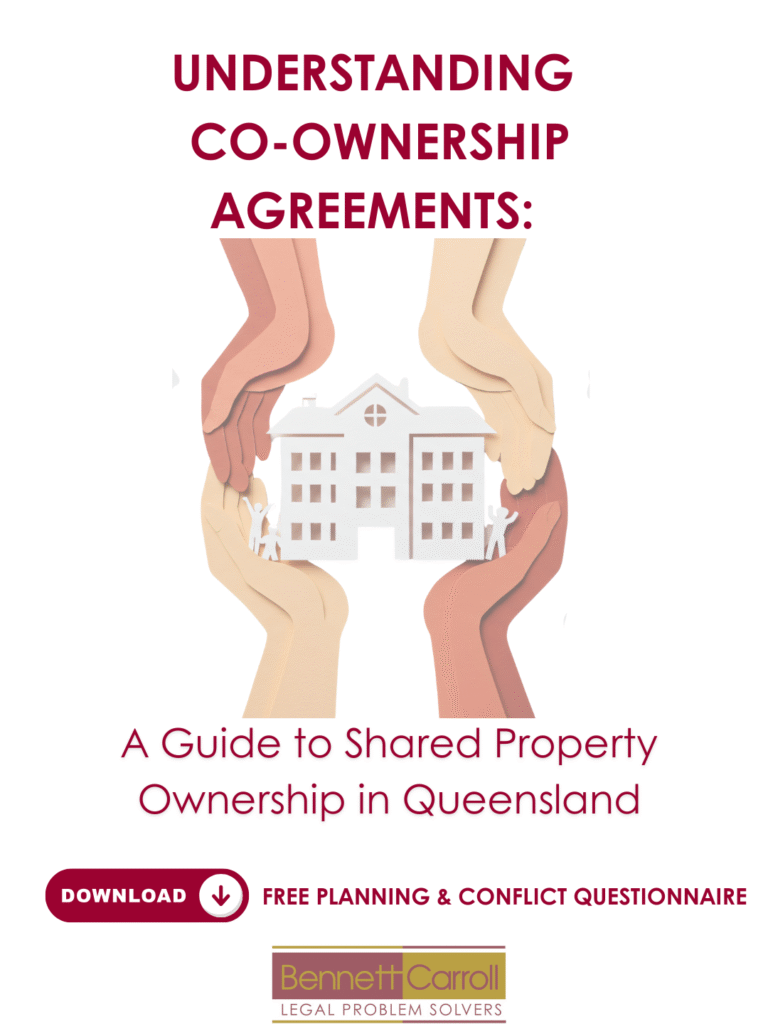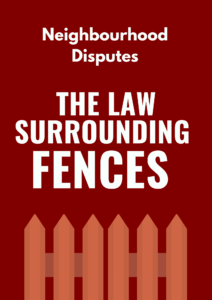Co-ownership agreements in Queensland are essential legal documents that govern the shared ownership of a property between two or more individuals. These agreements are particularly important in situations where people decide to jointly invest in real estate, business ventures, or other assets. A well-structured co-ownership agreement can help prevent disputes, clarify ownership rights, and establish a framework for managing the property. In this article, we explore the key elements and benefits of co-ownership agreements for shared property ownership in Queensland.
If you’re looking for legal help with co-ownership agreements, contact Bennett Carroll Solicitors today. Our Brisbane, Gold Coast, Ipswich and Sunshine Coast offices are ready to assist you in safeguarding your property and interests.
What is a Co-Ownership Agreement?
A co-ownership agreement, often referred to as a co-owners, co-tenancy or joint ownership agreement, is a legally binding document that outlines the rights, responsibilities, and obligations of each co-owner concerning a shared asset. This asset can be anything from real estate properties (such as houses, apartments, or land) to businesses, vehicles, or even valuable personal items.
Don’t have time to read the full guide? Our Co-Ownership Planning Questionnaire is designed to trigger the tough conversations now, so you don’t have to pay for them later.
Who are Co-Ownership Agreements for?
These are increasingly vital for anyone pooling resources to buy property, which is becoming particularly common given the rising cost of Queensland real estate. You should consider a formal agreement if you are:
- Friends or Siblings buying together to enter the market sooner.
- Parents and Children where the “Bank of Mum and Dad” wants to protect their equity.
- Investors pooling funds to purchase a real estate asset.
Key Elements of a Co-Ownership Agreement:
- Ownership Shares: The agreement should specify the percentage of ownership each co-owner holds in the shared property. This is crucial for determining each party’s share of expenses, income, and decision-making authority.
- Contributions: Co-owners typically make financial contributions to acquire and maintain the property. The agreement should detail each co-owner’s financial responsibilities, including the initial investment and ongoing expenses.
- Management and Decision-Making: It’s important to establish a framework for decision-making within the co-ownership arrangement. This includes determining how major decisions will be made, such as selling the property or making significant improvements.
- Use and Access: The agreement should outline how the shared property will be used and who has access to it. This might include rules for occupancy, rental, or use for business purposes.
- Maintenance and Repairs: Co-owners must agree on how they will handle maintenance and repair costs. This can involve setting up a maintenance fund, specifying who is responsible for what, and establishing a process for approving and conducting repairs.
- Dispute Resolution: In the event of conflicts or disagreements, the co-ownership agreement should provide a mechanism for dispute resolution, such as mediation or arbitration.
Benefits of Co-Ownership Agreements:
- Legal Clarity: Co-ownership agreements provide a clear and legally binding framework for shared ownership, reducing the likelihood of misunderstandings and disputes.
- Protecting Investments: These agreements protect each co-owner’s financial interests by specifying the terms of their investment and responsibilities.
- Decision-Making Structure: Co-ownership agreements establish a structure for making critical decisions, ensuring that all co-owners have a say and that decisions are made collectively.
- Property Management: They help ensure proper management of the property, including maintenance, repairs, and access rights.
- Exit Strategies: Co-ownership agreements often address exit strategies, such as the sale of the property or the buyout of a co-owner’s share. This can be crucial when circumstances change.
For personalised advice on co-ownership agreements, speak to an expert today.
Ready to formalise your arrangement?
Shared property ownership is a high-stakes commitment. To help you protect your equity, we’ve developed the Co-Ownership Planning Questionnaire.
Use this questionnaire to:
Identify potential conflicts before they happen.
Clarify financial contributions and “exit strategies.”
Fast-track your matter with our legal team.
Conclusion
Co-ownership agreements are invaluable tools for individuals who choose to invest in shared properties or assets. By establishing a clear and legally binding framework for ownership, contributions, management, and dispute resolution, co-ownership agreements help prevent misunderstandings and conflicts among co-owners. Whether you’re looking to invest in real estate, start a business, or co-own any valuable asset, taking the time to create a comprehensive co-ownership agreement can safeguard your investment and promote a harmonious co-ownership experience.
Looking for legal advice on co-ownership agreements? Call us today at 1300 334 566 or email info@bcglaw.com.au. With offices in Brisbane, Gold Coast, Ipswich and Sunshine Coast, Bennett Carroll Solicitors are your trusted legal partner in South East Queensland.
Other useful links:









